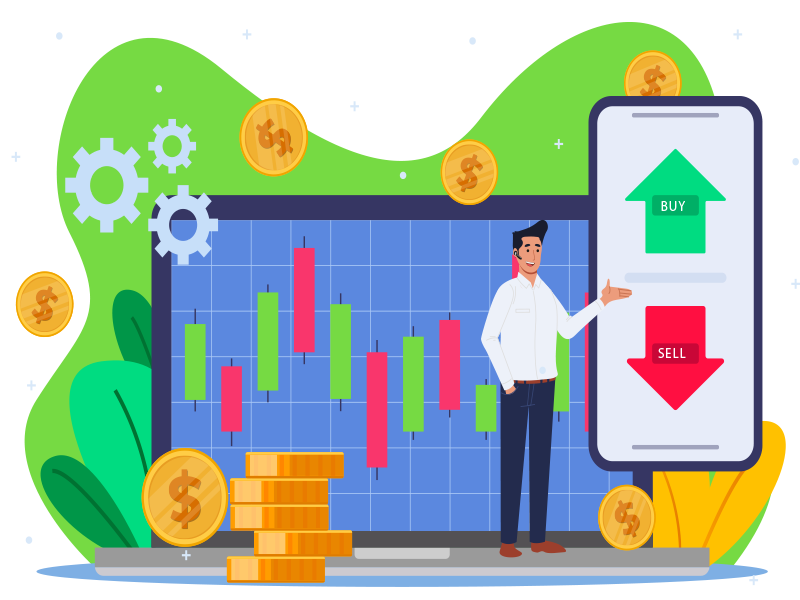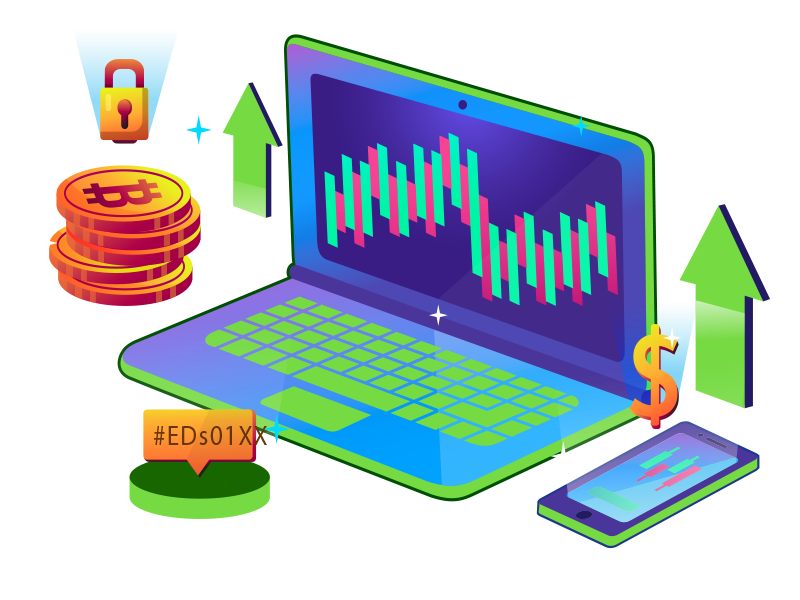


Cryptocurrency is a type of digital or virtual currency that uses cryptography for security and operates independently of a central authority, such as a government or bank. Unlike traditional currencies, cryptocurrencies exist only in digital form and are typically decentralized, meaning they are not controlled by any single entity.
Cryptocurrency trading is the act of speculating on cryptocurrency price fluctuations via a CFD trading account or purchasing and selling underlying coins on an exchange.
CFDs trading are derivatives that allow you to speculate on bitcoin price changes without owning the underlying currencies. You can go long ('buy') if you believe a cryptocurrency will increase in value, or short ('sell') if you believe it will decrease.
Both are leveraged instruments, which means you only need to make a little deposit (known as margin) to have full exposure to the underlying market. Your profit or loss is still determined based on the total size of your investment, so leverage magnifies both earnings and losses.

When you buy cryptocurrencies through an exchange, you are purchasing the coins themselves. To open a position, you must first register an exchange account, deposit the entire amount of the asset, and then hold the cryptocurrency tokens in your wallet until you are ready to sell
Exchanges have a high learning curve since you must first understand the technology and learn how to interpret the data. Many exchanges also limit the amount you may deposit, and accounts can be costly to maintain.

bitcoin mining is the process of verifying recent Bitcoin transactions and adding new blocks to the network.
Mining machines choose pending transactions from a pool and verify that the sender has enough coins to finish the transaction. This entails comparing the transaction details to the transaction history kept on the blockchain. A second check ensures that the sender authorized the transfer of money using their private key.
Mining computers combine legitimate transactions into a new block and attempt to create the cryptographic connection to the previous block by solving a difficult algorithm.
Cryptocurrencies operate on decentralized networks of computers using blockchain technology. Transactions are recorded on a public ledger called a blockchain, which is distributed across a network of computers (nodes). When a transaction occurs, it is verified and added to a block, which is then linked to the previous block, creating a chain of blocks (hence the term "blockchain").
With TraderEra, you may trade cryptocurrencies using a CFD account, which allows you to guess on where the value of your preferred cryptocurrency will grow or decline. Prices are listed in traditional currencies like the US dollar, and you never hold the cryptocurrency itself.
CFDs are leveraged products, so you can open a position for a portion of the trade's total value. Leveraged products can increase your earnings, but they can also increase your losses if the market goes against you.
The spread refers to the difference between the advertised buy and sell prices for a cryptocurrency. When you open a position on the Bitcoin market, you will be offered two prices, as is the case with many other financial marketplaces. If you wish to establish a long position, trade at the purchase price, which is somewhat higher than the market price. If you wish to start a short position, trade at the sell price, which is somewhat lower than the current market price.
Cryptocurrencies are frequently traded in lots, which are quantities of cryptocurrency tokens designed to standardize transaction sizes. Because cryptocurrencies are extremely volatile, lots are often quite tiny, with the majority being just one unit of the underlying coin. However, certain cryptocurrencies are exchanged in larger quantities.
Leverage is a method of acquiring exposure to big quantities of cryptocurrencies without having to pay the entire value of the deal upfront. Instead, you make a little deposit, known as a margin. When you end a leveraged position, your profit or loss is calculated based on the total amount of the transaction.
Blockchain is a decentralized and distributed ledger technology that records transactions across multiple computers in a way that is transparent, secure, and immutable. Each block in the blockchain contains a cryptographic hash of the previous block, along with transaction data. This makes it extremely difficult for anyone to alter the data retroactively without altering all subsequent blocks, providing a high level of security and trust in the system.
Blockchain is a decentralized and distributed ledger technology that records transactions across multiple computers in a way that is transparent, secure, and immutable. Each block in the blockchain contains a cryptographic hash of the previous block, along with transaction data. This makes it extremely difficult for anyone to alter the data retroactively without altering all subsequent blocks, providing a high level of security and trust in the system.
Investing in Bitcoin, the first and most well-known cryptocurrency, can be done through various methods:
Sign up for a cryptocurrency exchange platform like Coinbase, Binance, or Kraken. These platforms allow you to buy, sell, and trade Bitcoin and other cryptocurrencies using fiat currency (such as USD, EUR, etc.) or other cryptocurrencies.
Some regions have Bitcoin ATMs where you can purchase Bitcoin using cash or a debit/credit card. These machines usually charge higher fees compared to online exchanges.
Use P2P platforms like LocalBitcoins or Paxful to buy Bitcoin directly from other individuals. This method may offer more privacy but requires caution to avoid scams.
Investing in Bitcoin offers several potential benefits:
Bitcoin operates on a decentralized network, meaning it is not controlled by any single entity like a government or central bank.
Bitcoin has a limited supply, with only 21 million coins ever to be mined, making it potentially resistant to inflation.
Bitcoin's price has historically experienced significant volatility, offering the potential for high returns for investors.
Bitcoin can be accessed and traded from anywhere in the world with an internet connection, providing financial inclusion to people who may not have access to traditional banking services.